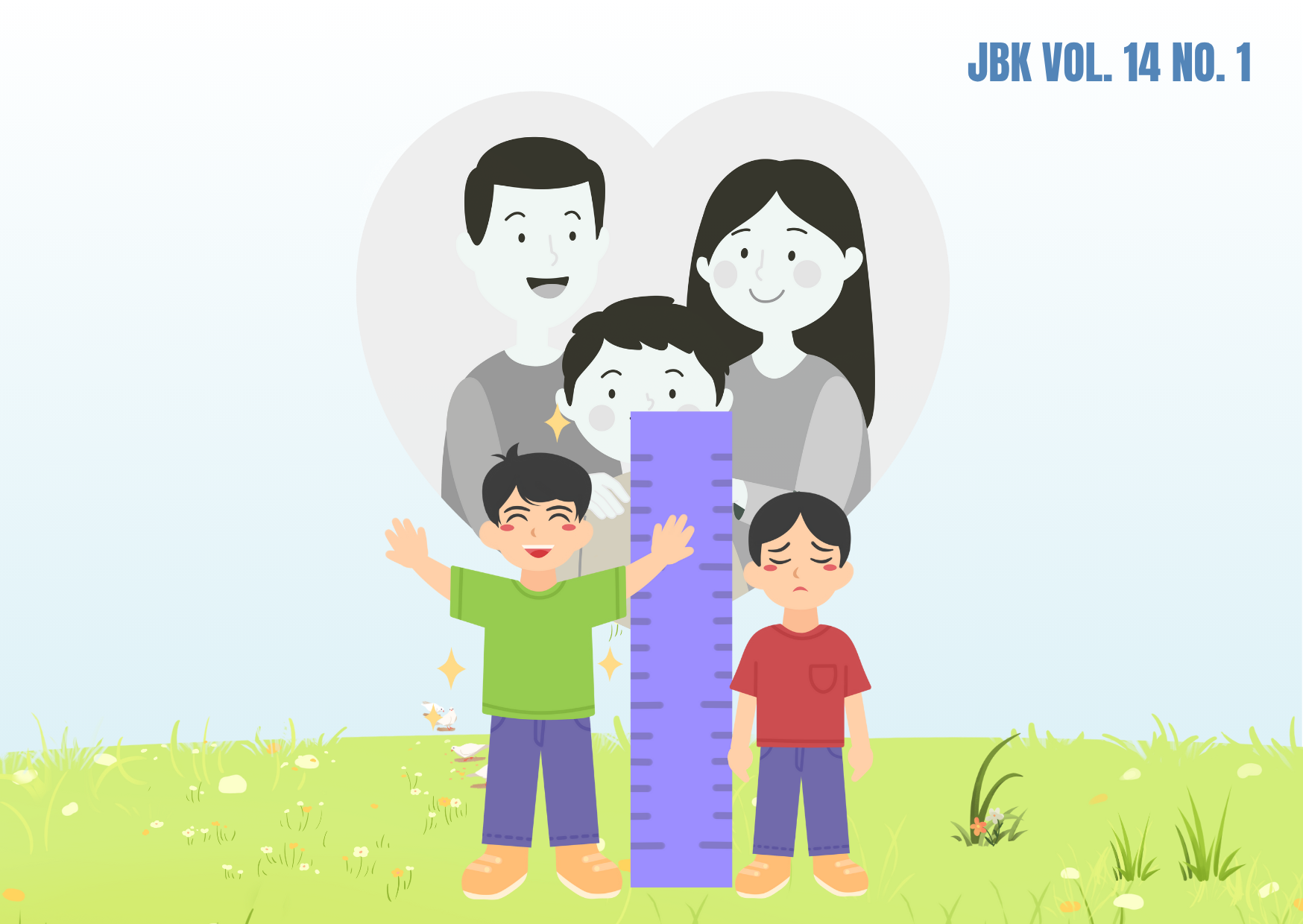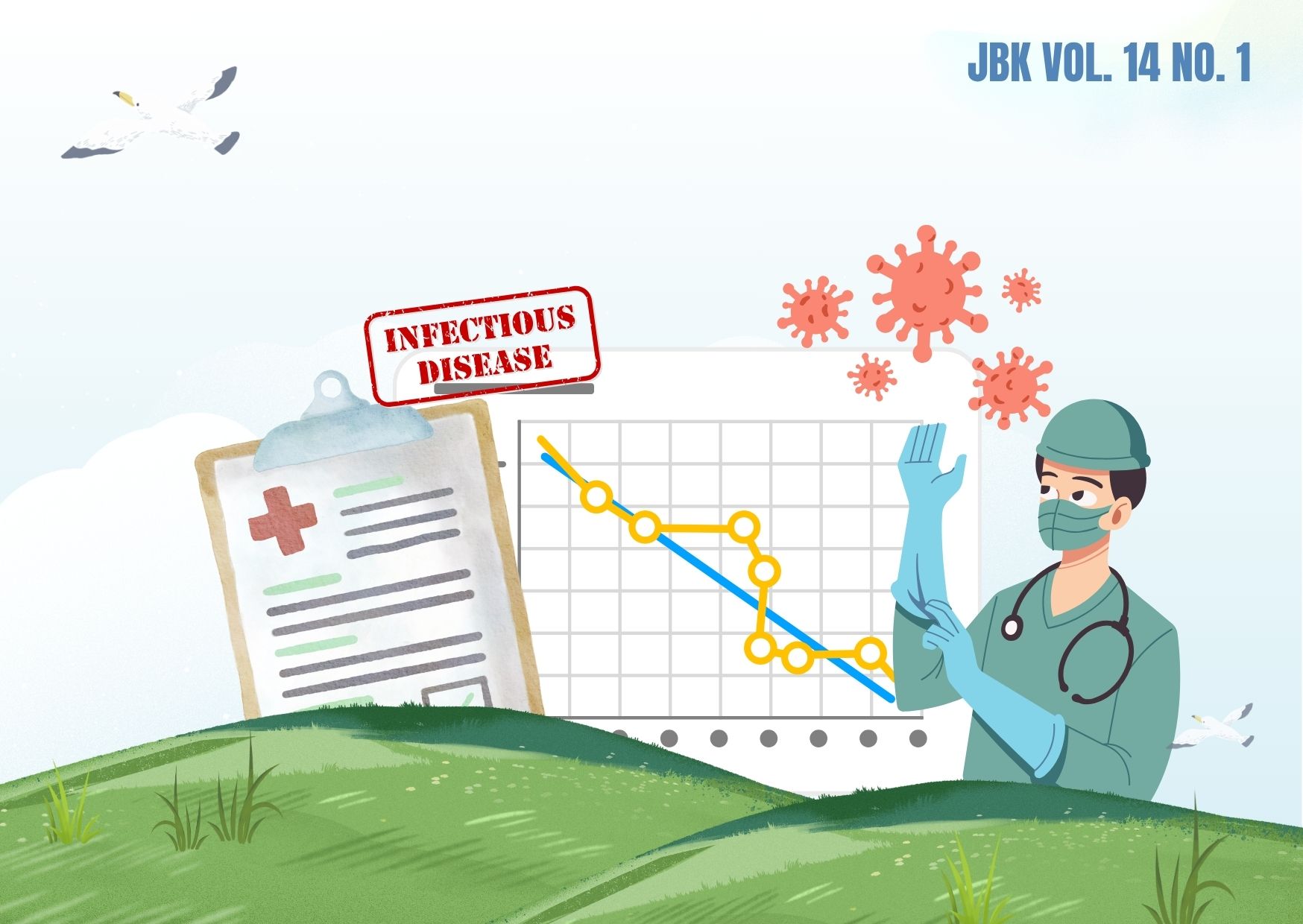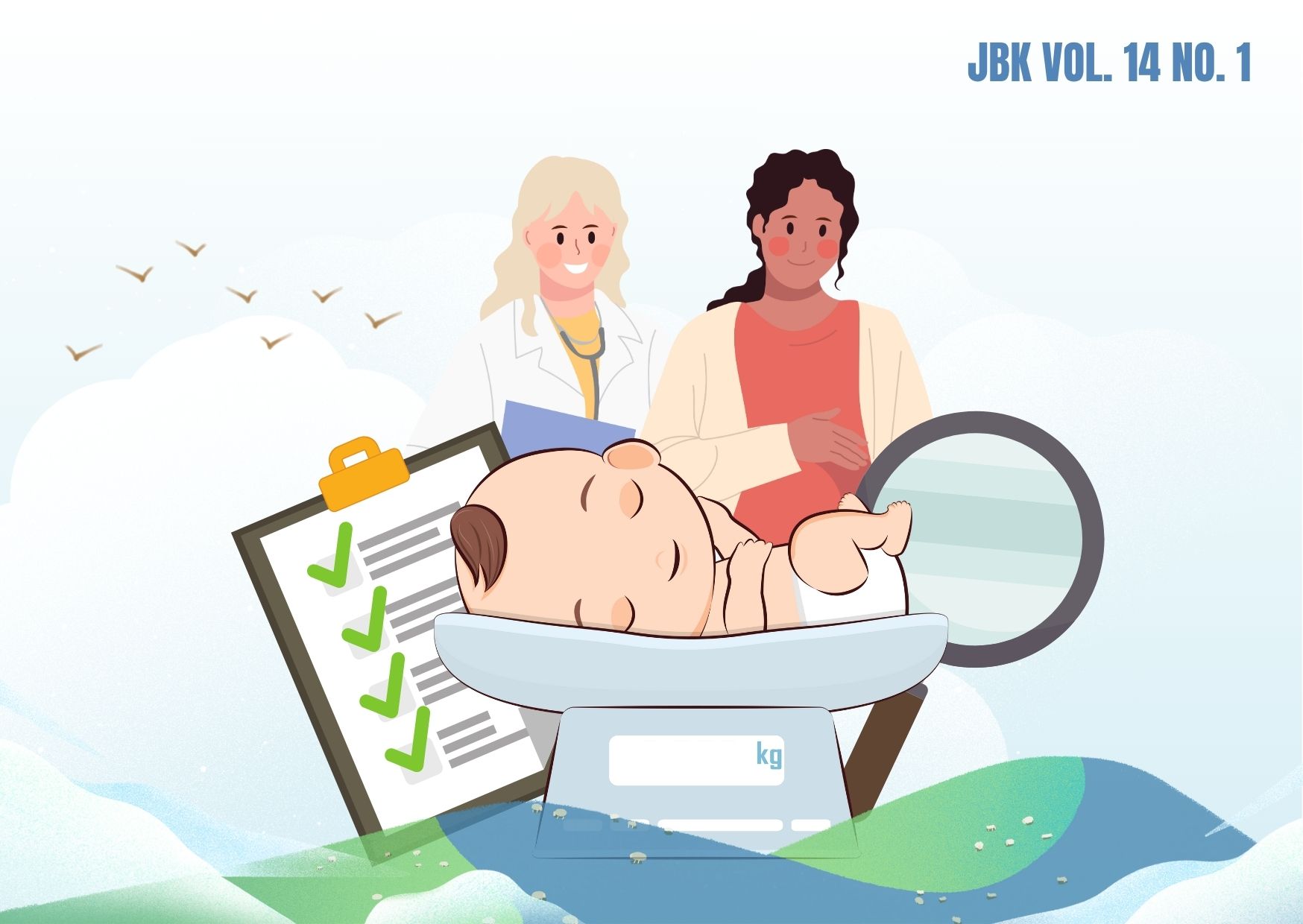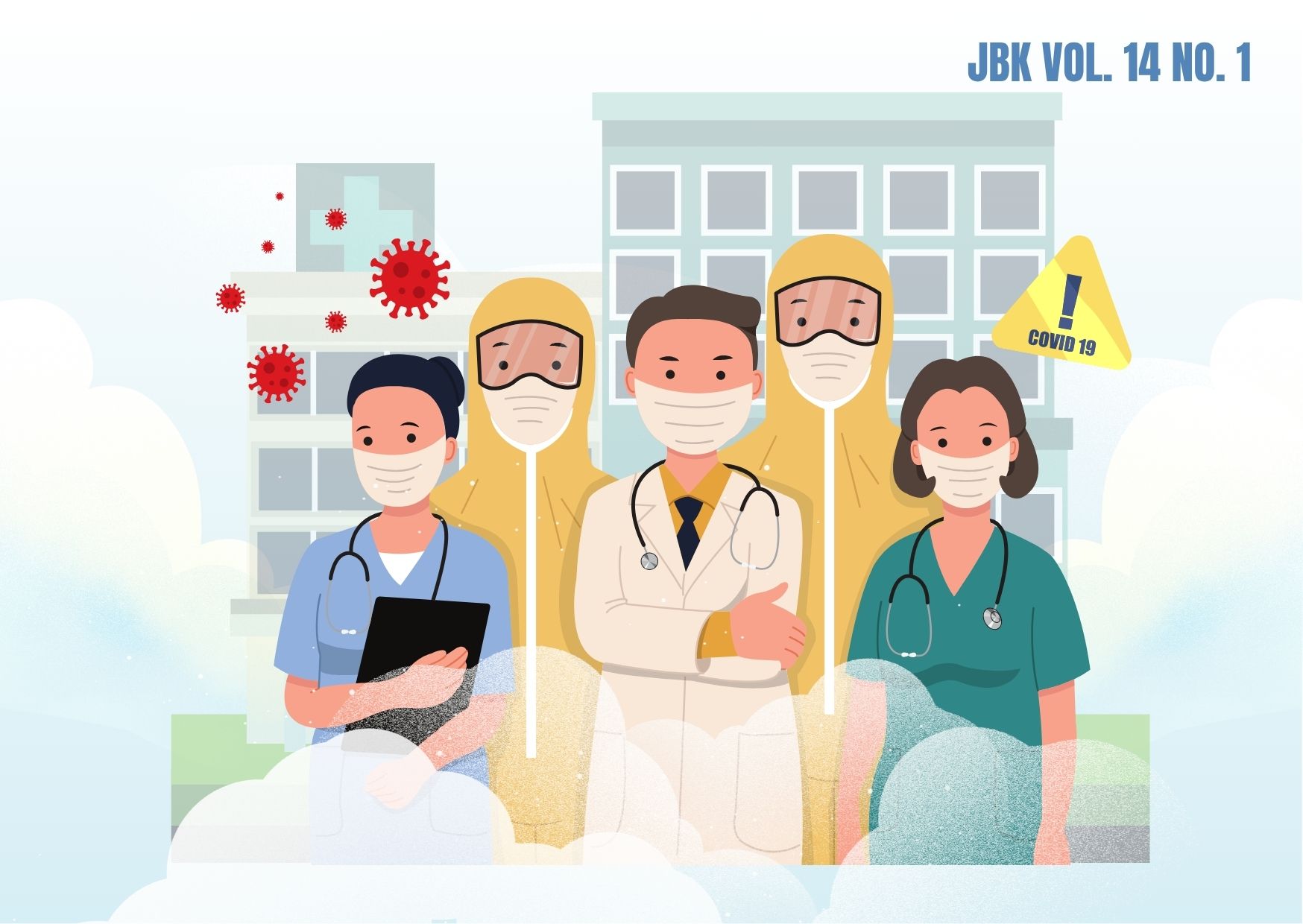SUPPORTING FACTORS FOR IMPLEMENTING EARLY BREASTFEEDING IN CHILDREN AGE 0-24 MONTHS (2017 IDHS DATA ANALYSIS)
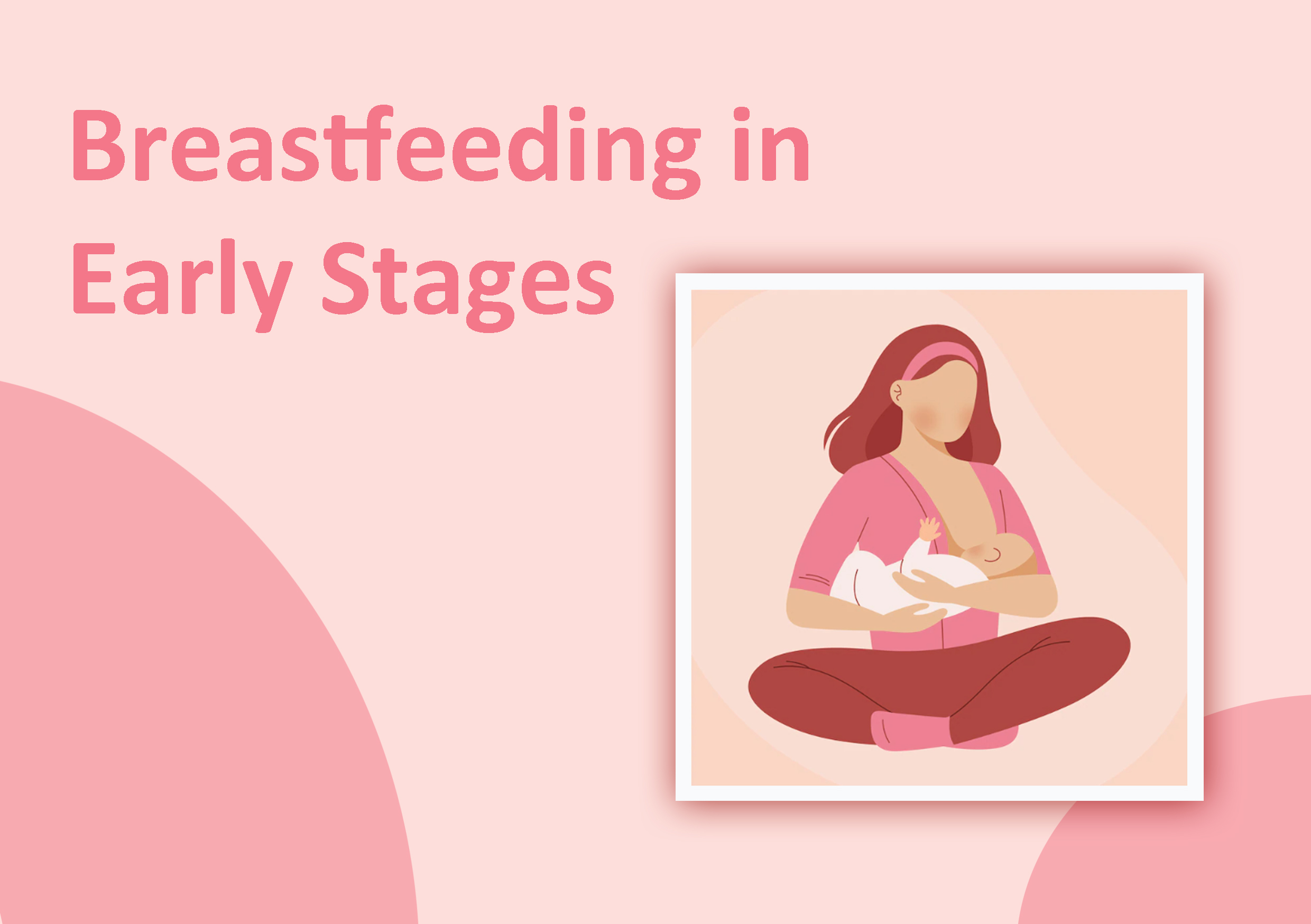
Downloads
Early Initiation of Breastfeeding (IMD) is an important step in early life and achieves the goals of Sustainable Development Goals (SDGs) in preventing infant mortality by 2030. Providing Early Initiation of Breastfeeding is also the first step in achieving the success of exclusive breastfeeding up to 6 months of age. The mistake of providing IMD and exclusive breastfeeding can lead to nutritional deficiencies which will affect the intellectual decline of infants and threaten human potential in the future, especially in Indonesia. This research aims to analyze the supporting factors for the implementation of Early Breastfeeding Initiation (IMD) in children aged 0-24 months. The method in this research is a cross-sectional study to analyze the relationship between all the variables studied using secondary data from the 2017 Indonesian Demographic and Health Survey (IDHS) collected from 6,291 children who had received breastfeeding and women aged 15-49 years who had done birth during the last 5 years. The results showed that the factors supporting the successful implementation of early initiation of breastfeeding in children aged 0-24 months were maternal education (p=0.0009) and wealth quintile factors (p=0.037). Meanwhile, place of birth and area of residence factors showed that there was no relationship with the successful implementation of early initiation of breastfeeding in children aged 0-24 months.
Nasution F. Inisiasi Menyusu Dini dan Bounding Attachment dalam Peningkatan Kesehatan secara Fisik dan Psikis. J JUMANTIK. 2017;2(2):100–11. Available from: http://jurnal.uinsu.ac.id/index.php/kesmas/article/view/1213
National Family Planning Population Agency. Indonesian Demographic and Health Survey. Survey Demografi dan Kesehatan Indonesia. Survei Demografi dan Kesehatan Indonesia 2017. 2017. 147–178 p. Available from: https://www.scribd.com/document/391650307/Laporan-Sdki-2017-Wus
Novianti N, Mujiati M, Amaliah N. Analisa Proses Pelaksanaan Inisiasi Menyusu Dini (Studi Kasus di Rumah Sakit Swasta X dan Rumah Sakit Pemerintah Y di Jakarta). J Kesehat Reproduksi. 2018;9(2): 135–48. Available from: https://ejournal2.litbang.kemkes.go.id/index.php/kespro/article/view/90
Indonesian Ministry of Health. Regulation of the Minister of Health of the Republic of Indonesia Number 39 of 2016 concerning Guidelines for the Implementation of the Healthy Indonesia Program with a Family Approach. Indonesian Ministry of Health. 2016. Available from: https://peraturan.bpk.go.id/Home/Details/113087/permenkes-no-39-tahun-2016
Indonesian Ministry of Health. Regulation of the Minister of Health of the Republic of Indonesia Number 43 of 2016 concerning Standards Minimum Service in the Health Sector. 2016. Available from: https://peraturan.bpk.go.id/Home/Details/113091/permenkes-no-43-tahun-2016
Novianti N, Mujiati M. Faktor Pendukung Keberhasilan Praktik Inisiasi Menyusu Dini di RS Swasta dan Rumah Sakit Pemerintah di Jakarta. Pus Teknol Interv Kesehat Masyarakat, Badan Litbang Kementeri Kesehat RI. 2015;6(1):31–44. doi: https://doi.org/10.22435/kespro.v6i1.4756.31-44
Mawaddah S. Hubungan Inisiasi Menyusu Dini dengan Pemberian Asi Ekslusif pada Bayi. J Info Kesehat. 2018;16(2):214–25. doi: https://doi.org/10.31965/infokes.Vol16.Iss2.185
Raharjo BB. Profil Ibu dan Peran Bidan dalam Praktik Inisiasi Menyusu Dini dan Asi Eksklusif. KEMAS - J Kesehat Masy. 2014;10(1):53–63. Available from: https://journal.unnes.ac.id/nju/index.php/kemas/article/view/3070
Amin W, Agung IW, Sri E. Pengaruh Faktor Sosial Ibu terhadap Keberhasilan Menyusui pada Dua Bulan Pertama. J Kedokt Brawijaya. 2014;28(2):146–51. doi: https://doi.org/10.21776/ub.jkb.2014.028.02.16
Indonesian Ministry of Health. Regulation of the Ministry of Health of the Republic of Indonesia Number 66 of 2014 concerning Monitoring of Child Growth, Development, and Developmental Disorders. 2014. Available from: https://peraturan.go.id/common/document/bn/2014/bn1524-2014.pdf
Fikawati S, Syafiq A, Karima K. Gizi Ibu dan Bayi. Jakarta: Rajawali Pers; 2015. Available from: https://www.rajagrafindo.co.id/produk/gizi-ibu-dan-bayi/
Novianti, Rizkianti A. Pemberian Asupan Prelakteral sebagai Salah Satu Kegagalan ASI Eksklusif pada Pekerja Buruh Industri Tekstil di Jakarta. J Kesehat Reproduksi. 2014;5(1):23–36. Available from: http://ejournal.litbang.kemkes.go.id/index.php/kespro/article/view/3880
Rosha BC, Utami NH. Determinan Pemberian Makanan Prelaktal pada Bayi Baru Lahir di Kleurahan Kebon Kelapa dan Ciwaringin, Kota Bogor. Penelit Gizi dan Makanan. 2013;36(1):54–61. Available from: http://ejournal.litbang.kemkes.go.id/index.php/pgm/article/view/3395
Fikawati S, Syafiq A. Kajian Implementasi dan Kebijakan Air Susu Ibu Eksklusif dan Inisiasi Menyusu Dini di Indonesia. Makara J Heal Res. 2010;14(1):17–24. Available from: http://journal.ui.ac.id/index.php/health/article/view/642/627
Kharisma M, Efni N. Hubungan Pengetahuan Ibu tentang Tumbuh Kembang dengan Perkembangan Anak Usia 3-4 Tahun di Kelompok Bermain Golden Kids di Kecamatan Telanai Pura Kota Jambi. J Akasemika Baiturrahim. 2017;6(1):26–39. Available from: http://jab.stikba.ac.id/index.php/jab/article/view/15
Indonesian Ministry of Health. Riskesdas 2018 National Report. Health Research and Development Agency. 2018. p. 198. Available from: http://labdata.litbang.kemkes.go.id/images/download/laporan/RKD/2018/Laporan_Nasional_RKD2018_FINAL.pdf
Yuwansyah Y. Faktor-Faktor yang Berhubungan dengan Pelaksanaan Inisiasi Menyusu Dini (IMD) pada Ibu Bersalin di Wilayah Kerja UPTD Puskesmas Cigasong Kabupaten Majalengka Tahun 2015. J Bidan (Midwife Journal) [Internet]. 2017;3(1):73–82. Available from: http://jurnal.ibijabar.org/
Sirajuddin S, Abdullah T, Lumula SN. Determinan Pelaksanaan Inisiasi Menyusu Dini. J Kesehat Masy Nas [Internet]. 2013;8(3):99–103. Available from: http://dx.doi.org/10.21109/kesmas.v8i3.350
Aryani N. Faktor-Faktor yang Berhubungan dengan Inisiasi Menyusu Dini di Wilayah Kerja Puskesmas Satelit Bandar Lampung. J Kesehat Panca Bhakti Lampung [Internet]. 2018;6(1):35–51. Available from: http://ejournal.pancabhakti.ac.id/index.php/jkpbl/article/view/24
Norhana A, Arifin S, Yulidasari F. Hubungan Tempat Persalinan dan Jenis Penolong Persalinan dengan Pelaksanaan Inisiasi Menyusu Dini di Puskesmas Martapura. J Publ Kesehat Masy Indones [Internet]. 2016;3(2):51–8. Available from: https://ppjp.ulm.ac.id/journal/index.php/JPKMI/article/view/2750/2396
Lestari P. Beberapa Faktor yang Mempengaruhi Kegagalan Inisiasi Menyusu Dini (Studi Kasus di RSUD Kardinah Tegal). Medica Hosp J Clin Med [Internet]. 2014;2(3):184–90. Available from: https://doi.org/10.36408/mhjcm.v2i3.194
Ginting EP, Zuska F, Simanjorang A. Faktor-Faktor yang Memengaruhi Kegagalan Inisiasi Menyusui Dini pada Ibu Post Sectio Caesarea di Rumah Sakit Tentara Binjai Tahun 2018. J Kesehat Perintis [Internet]. 2019;6(1):81–8. Available from: https://doi.org/10.33653/jkp.v6i1.213
Sriningsih I. Faktor Demografi, Pengetahuan Ibu Tentang Air Susu Ibu dan Pemberian ASI Eksklusif. KEMAS J Kesehat Masy [Internet]. 2011;6(2):100–6. Available from: https://journal.unnes.ac.id/nju/index.php/kemas/article/view/1759
Copyright (c) 2022 Jurnal Biometrika dan Kependudukan

This work is licensed under a Creative Commons Attribution-NonCommercial-ShareAlike 4.0 International License.
Copyright©2022 Jurnal Biometrika dan Kependudukan (Journal of Biometrics and Population)
This work is licensed under a Creative Commons Attribution-NonCommercial-ShareAlike 4.0 International License.
1. Copyright of all journal manuscripts is held by the Jurnal Biometrika dan Kependudukan.
2. Formal legal provisions to access digital articles of the electronic journals are subject to the provision of the Creative Commons Attribution-ShareAlike license (CC BY-NC-SA), which means that Jurnal Kesehatan Biometrika dan Kependudukan to keep, transfer media/format, manage in the form of databases, maintain, and publish articles.
3. Published manuscripts both printed and electronic are open access for educational, research, and library purposes. Additionally, the editorial board is not responsible for any violations of copyright law.






























